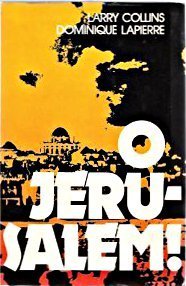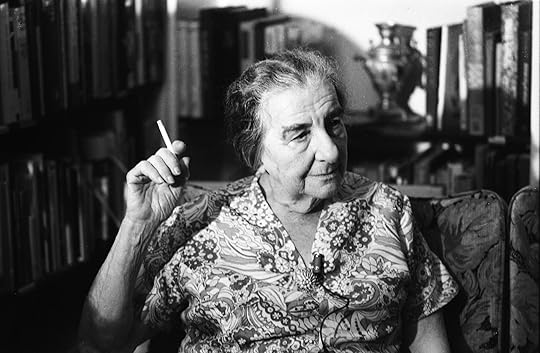This book documents the Jewish struggle to create the tiny state of Israel and the struggle of the Arabs and British to crush it, with particular focus on Jerusalem. It contains some interesting accounts and much interesting information, but it is not without its flaws.
Beginning with the decision at the United Nations at Flushing Meadow to accept the re-partition of the Land of Israel into two states, one Jewish and one Arab, and the violent Arab reaction, it leaves out the fact the Britain's Palestine Mandate of 1920, included what is now the State of Israel, the disputed territories (the West Bank (Judea and Samaria) and Gaza) and Jordan.
In 1922 Transjordan (later Jordan) set up on three-fourths of Palestine, leaving one-fourth of Palestine for the Jewish national home. Therefore the partition plan accepted in 1947 left the Jews with only 13% of the original Palestine Mandate.
O Jerusalem partially covers the biography of Hitler's ally, and founder of the "Palestinian" Arab movement, Mufti Haj Amin El Husseini. Husseini stirred up the bloody Arab pogrom against the Jews, in the Old City of Jerusalem, in 1920. Two years later, at the instigation of the British Mandates political secretary, the rabidly anti-Jewish E.T Robinson, he was appointed "Mufti of Jerusalem", the equivalent of Bishop of a city, with Jewish and not Moslem routes, and a Jewish, not Moslem plurality.
Haj Amin El Husseini manipulated his way to becoming President of the Moslem Supreme Council, and in the following years, he set himself up as an unchallenged dictator of all the Moslems in the Holy Land, through a combination of patronage and terror, in which thousands of Arab opponents and potential or suspected opponents where murdered on the orders of the Mufti, in a bloody purge.
In 1929, the Mufti orchestrated more violent of Jews in Palestine, covering the Land of Israel in the blood of Jewish men, women and children.
When the British finally decided to arrest him, he fled to Beirut and later to Baghdad, where in 1941, he aided in a Nazi-backed plot to overthrow the British government in Iraq. When the plot failed he fled to Iran and then to Nazi Germany where he formed a close friendship with Adolph Hitler and attended Nazi rallies as an honoured guest.
He did everything in his power to achieve an Axis victory. He recruited Arab agents to drop behind the British lines as saboteurs and raised two divisions of Bosnian Moslems for the SS. He facilitated the German entry into Tunisia and Libya. He personally visited the Nazi death camps including Auschwitz and he urged the Nazis to speed up the Final Solution. In 1943 Husseini personally influenced Reich Foreign Minister Ribbentrop to prevent four thousand Jewish children being sent to Israel, instead diverting them to Hitler's death camps where they perished.
It was the Mufti who led `Palestinian' Arab forces against the fledgling Jewish State, and who is a much-admired uncle of PLO leader Yasser Arafat.
We also learn that Haj Amin was not the only Arab terrorist to be trained in Nazi Germany, as part of the Axis war effort. The commander of the Arab Liberation Army , Fawzi el Kaujki was a noted celebrity in Berlin during World War II , where he was furnished with every luxury he needed by Hitler's Nazi regime, including his blonde German wife.
The book covers the role in the war effort of the War of Independence of the likes of David Ben-Gurion, Golda Meir, David Shaltiel, Yitzhac Rabin, Yigal Allon, Yigal Yadin and millions of ordinary Jewish men and women. Unfortunately the Revisionist freedom fighters -Irgun and Lehi -do not get fair treatment and are unjustly maligned in the book. The account given of the alleged massacre of Arabs during the Battle of Deir Yassin is based on the lies of the Arabs and their British allies. Unfortunately the Hagannah, the military wing of the Labour Zionists added to these lies to malign their political opponents in the Irgun and Lehi.
A heroic account is given of the struggle of the Jews of Jerusalem, to survive Arab attacks and starvation.
Merged review:
This book documents the Jewish struggle to create the tiny state of Israel and the struggle of the Arabs and Whitehall and British Colonial authorities to crush it, with particular focus on Jerusalem. It contains some interesting accounts and much interesting information, but it is not without its flaws.
Beginning with the decision at the United Nations at Flushing Meadow to accept the re-partition of the Land of Israel into two states, one Jewish and one Arab, and the violent Arab reaction, it leaves out the fact the Britain's Palestine Mandate of 1920, included what is now the State of Israel, the disputed territories (the West Bank (Judea and Samaria) and Gaza) and Jordan.
In 1922 Transjordan (later Jordan) set up on three-fourths of Palestine, leaving one-fourth of Palestine for the Jewish national home. Therefore the partition plan accepted in 1947 left the Jews with only 13% of the original Palestine Mandate.
O Jerusalem partially covers the biography of Hitler's ally, and founder of the "Palestinian" Arab movement, Mufti Haj Amin El Husseini. Husseini stirred up the bloody Arab pogrom against the Jews, in the Old City of Jerusalem, in 1920. Two years later, at the instigation of the British Mandates political secretary, the rabidly anti-Jewish E.T Robinson, he was appointed "Mufti of Jerusalem", the equivalent of Bishop of a city, with Jewish and not Moslem roots, and a Jewish, not Moslem plurality.
Haj Amin El Husseini manipulated his way to becoming President of the Moslem Supreme Council, and in the following years, he set himself up as an unchallenged dictator of all the Moslems in the Holy Land, through a combination of patronage and terror, in which thousands of Arab opponents and potential or suspected opponents where murdered on the orders of the Mufti, in a bloody purge.
In 1929, the Mufti orchestrated more violent of Jews in Palestine, covering the Land of Israel in the blood of Jewish men, women and children.
When the British finally decided to arrest him, he fled to Beirut and later to Baghdad, where in 1941, he aided in a Nazi-backed plot to overthrow the British government in Iraq. When the plot failed he fled to Iran and then to Nazi Germany where he formed a close friendship with Adolph Hitler and attended Nazi rallies as an honoured guest.
He did everything in his power to achieve an Axis victory. He recruited Arab agents to drop behind the British lines as saboteurs and raised two divisions of Bosnian Moslems for the SS. He facilitated the German entry into Tunisia and Libya. He personally visited the Nazi death camps including Auschwitz and he urged the Nazis to speed up the Final Solution. In 1943 Husseini personally influenced Reich Foreign Minister Ribbentrop to prevent four thousand Jewish children being sent to Israel, instead diverting them to Hitler's death camps where they perished.
It was the Mufti who led `Palestinian' Arab forces against the fledgling Jewish State, and who is a much-admired uncle of PLO leader Yasser Arafat.
We also learn that Haj Amin was not the only Arab terrorist to be trained in Nazi Germany, as part of the Axis war effort. The commander of the Arab Liberation Army , Fawzi el Kaujki was a noted celebrity in Berlin during World War II , where he was furnished with every luxury he needed by Hitler's Nazi regime, including his blonde German wife.
The book covers the role in the war effort of the War of Independence of the likes of David Ben-Gurion, Golda Meir, David Shaltiel, Yitzhac Rabin, Yigal Allon, Yigal Yadin and millions of ordinary Jewish men and women. Unfortunately the Revisionist freedom fighters -Irgun and Lehi -do not get fair treatment and are unjustly maligned in the book. The account given of the alleged massacre of Arabs during the Battle of Deir Yassin is based on the lies of the Arabs and their British allies. Unfortunately the Hagannah, the military wing of the Labour Zionists added to these lies to malign their political opponents in the Irgun and Lehi.
A heroic account is given of the struggle of the Jews of Jerusalem, to survive Arab attacks and starvation


